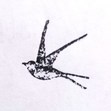Missives from Isolation #12 – Endings
Last instalment of the Curtis Brown this week, alas (which means I’m going to have to think of something else to post every week for a while… hmm…). As usual, I got a prompt – but this time it wasn’t the first line of the story, but the last, which proved an interesting challenge.
‘The first plane drew a line across the sky’. Sounds nice enough. I’m sure nothing could go wrong with a story based on that …
The major pinched the bridge of her nose in frustration, and tried again.
“Sir,” she said, indicating their marker on the sophisticated holographic map which had probably cost as much as a regiment’s monthly rations, “I dislike leaving an open avenue of attack. Especially when we have so comprehensively fortified every other approach.” No thanks to the brass, of course; that had been hard graft from her grunts and the other companies assigned to the defence, coordinated by the major and the other unit chiefs. The orders from above had been little more than ‘Dig in and repel the enemy’, which had been about as helpful as high-visibility body armour. Which I’m sure will be issued very soon. But they were infantry – they had plenty of one-shot missiles and a few belt-fed cannons, and they’d dug a decent enough trench line around their position, festooning it with all manner of spikes and wire. They were shut tight against a ground assault, which was reassuring.
What wasn’t reassuring was that they were almost completely open to an attack by air, and despite repeated requests for a supply drop they’d received nothing from behind the lines. Nothing, that was, except for General Marr. And if she tried to use him as an anti-air defence she was fairly certain it wouldn’t go down very well.
“Your concerns are noted, Major,” said General Marr, stroking his ridiculous moustache as he glanced down at the holographic map and pretended to know what he was looking at. “But, as you have so helpfully stated, your troops have fortified this position beautifully.”
“Except from an air assault, sir.”
“Which we need not worry about, Major,” the general replied. “I am privy to the latest intelligence reports from headquarters, as you know.” As you haven’t stopped telling me and the other chiefs since you arrived. “The enemy’s air power is functionally non-existent. They will be coming by land, and we are prepared for an attack by land. You and the other company chiefs have done an outstanding job.” The compliment just made the major bristle, dripping as it was with condescension.
“Can no anti-air equipment be spared, sir?”
“You have your complement of missiles, do you not?” asked Marr, stepping away from the projector to look out across the camp from the narrow slit-window of the prefabricated bunker. They had a good vantage over the plateau below, and the camp was, the major had to admit, an impressive sight.
“We do have half a dozen Hornets, sir,” the major replied. Half a dozen ancient one-use fly-by-wires dug out of an empty warehouse. Technically, it was all an infantry company needed to repel an air attack. Practically, every unit chief knew that no more than two of the missiles would even get a target lock, let alone actually hit anything.
“Then I fail to see the problem, Major,” Marr said crisply, folding his hands behind his back. “You’ve done a fine job. Besides, we at Command have high hopes of an armistice within two days.” I’m sure you do, the Major thought uncharitably. She and the other unit chiefs had experienced plenty of Command’s optimism over the last few months. They’d all learned to take anything the top brass said with a hefty pinch of salt.
She tried one more time, just in case.
“I appreciate the update,” she said, “but I’m sure I speak for all the chiefs when I say a flak cannon or two would be very much apprec – ”
“As I said, Major,” Marr interrupted, “while I appreciate that you have misgivings, there is no need to be concerned.” He smiled broadly and disingenuously. “This will all be over in two days.”
He turned sharply from the window and strode over to the bunker door.
“Now, I would very much like a tour of the defences,” he said, keying the code that opened the heavy metal door. “Please lead the – ”
The siren cut him off, a low wail that built to a deafening shriek, cutting through the air like a knife. The major was out of the door before realising she was even moving and halfway up the narrow stair that wrapped around the outside of the bunker, on its roof and fumbling for her binoculars before General Marr had even realised she was gone. She heard him clumping up the stairs behind her as she scanned the horizon, panning the scopes across the distant hills that ringed the plateau.
“I don’t understand,” she heard Marr say, as, below the command bunker, the shouts of sergeants calling their squads to order began to compete with the ear-splitting wail of the warning siren. “We were assured – ”
“No plan survives contact with the enemy, sir,” the major said absently, finally spotting movement. There we are. She smiled grimly as she lowered the binoculars. Sometimes she hated being right. She turned on her radio.
“Quartermasters, issue the Hornets. Sergeants, get everyone in decent cover. Point everything straight up and let’s get to hoping, shall we?” Air power non-existent my arse. She turned to Marr and fixed him with her sweetest smile. “You may want to take cover in the bunker, sir. Wait for that armistice. Only two days away.”
She ignored the general’s outraged bluster, drew her sidearm and made for the stairs, as above their heads the first plane drew a line across the sky.



